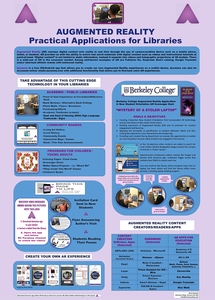Augmented Reality: Practical Applications for Libraries
Tools
DEPTULA, Maria (2017) Augmented Reality: Practical Applications for Libraries. Paper presented at: IFLA WLIC 2017 – Wrocław, Poland – Libraries. Solidarity. Society. in Session 112 - Poster Sessions.
Bookmark or cite this item: https://library.ifla.org/id/eprint/1893
Language:
English (Original)
Available under licence Creative Commons Attribution.
Bookmark or cite this item: https://library.ifla.org/id/eprint/1893/1/p-158-deptula-en_poster.jpg
Abstract
Augmented Reality: Practical Applications for Libraries
Augmented Reality (AR) overlays digital content onto reality in real time through the use of camera-enabled devices such as mobile phones, tablets, or/and headsets. There is already a widespread use of AR in the consumer market. In educational settings, AR provides us with the ability to enrich real world materials with digital content such as videos and instructional tutorials at the point-of-need. Applications such as Aurasma allow us to create our own augmented reality experiences, adding engagement and interactivity into instruction and programming. In Fall 2016, Berkeley College librarians applied Augmented Reality technology to its New Student Orientation. Students were asked to participate in the AR scavenger hunt to solve “The Mystery of a Stolen Laptop.” This poster, in addition to explaining the goals and the rules of this of gamified activity, presents many ideas of how AR can be used in a library setting and to the community’s advantage. At Berkeley College, Paramus, the librarian created a campus channel in Aurasma and turned many flyers and announcements into an AR experience. Behind the images on this poster, one can decode the augmented message through videos overlaying the images. One part of the poster explains how easily one can create an aura with the Aurasma app. The poster also lists selected AR content creators, hardware and apps for educational purposes. The author of this poster encourages IFLA poster session visitors to take advantage of this innovative technology and develop displays and activities which might greatly improve libraries’ ability to engage their patrons in learning through technology as well as add interactivity to programming.| Item Type: | Conference or Workshop Item (Poster) | ||||||
|---|---|---|---|---|---|---|---|
| Conference details: | IFLA WLIC 2017 – Wrocław, Poland – Libraries. Solidarity. Society.Session 112 - Poster Sessions |
||||||
| Related URLs: | |||||||
| Authors: |
|
||||||
| Date Deposited: | 07 Sep 2017 10:24 | ||||||
| Last Modified: | 07 Sep 2017 10:24 | ||||||
| URI: | https://library.ifla.org/id/eprint/1893 |
FOR IFLA HQ (login required)

|
Edit item |

 Tools
Tools Tools
Tools![[img]](/1893/1.hassmallThumbnailVersion/p-158-deptula-en_poster.jpg)
